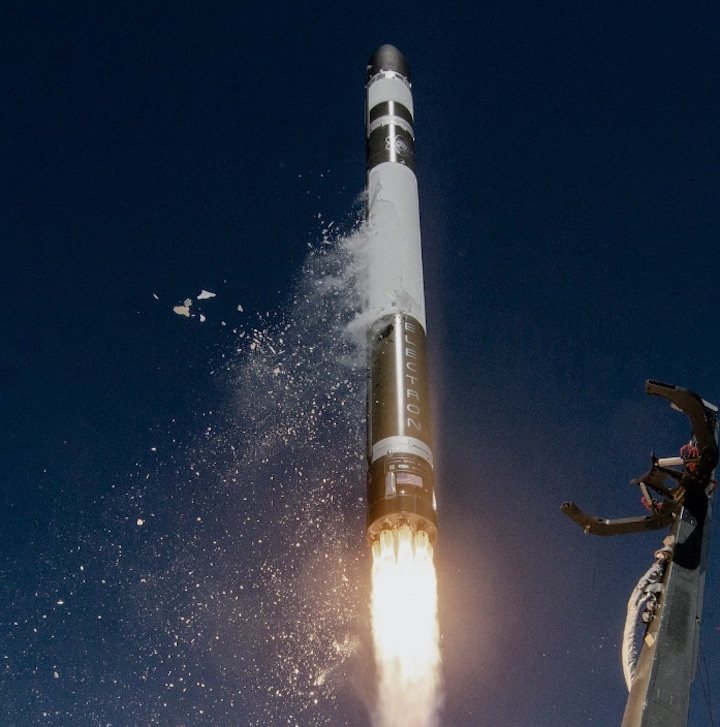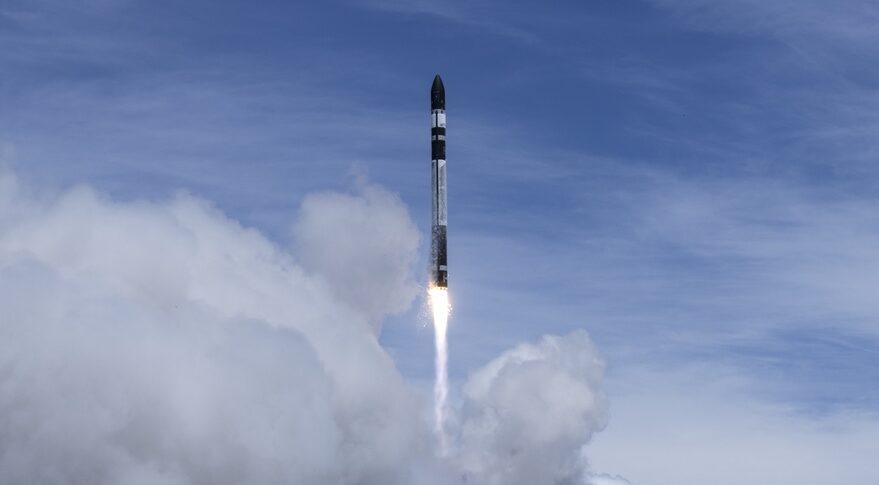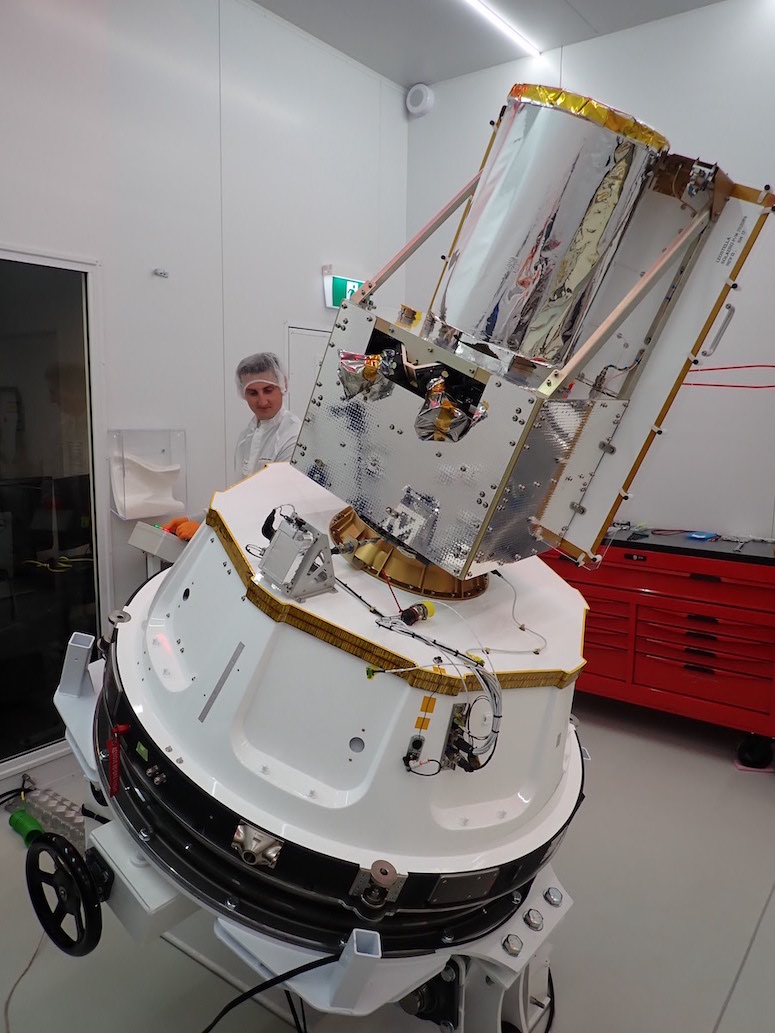2.12.2021

“A Data With Destiny” launch window opens Dec 7 on a mission to deploy two spacecraft for BlackSky real-time geospatial intelligence constellation
LONG BEACH, Calif.--(BUSINESS WIRE)-- Rocket Lab USA, Inc. (Nasdaq: RKLB), a leading launch and space systems company, has today revealed its next Electron mission is scheduled to take place during a launch window that opens on December 7, 2021, fewer than three weeks since Rocket Lab’s most recent mission on November 18, 2021. These two missions for BlackSky (NYSE: BKSY) occur 19 days apart and represent Rocket Lab’s quickest turnaround in its launch history.
The “A Data With Destiny” mission for BlackSky managed through global launch services provider Spaceflight Inc., will be Rocket Lab’s 23rd Electron launch and sixth mission of 2021. Rocket Lab will not be attempting to recover Electron for this mission.
Scheduled to launch from Rocket Lab Launch Complex 1 in New Zealand during a launch window that opens December 7, 2021 UTC, Electron will lift-off to deploy two BlackSky satellites to low-Earth orbit as part of the company’s rapid expansion of its satellite constellation. BlackSky combines high-resolution images captured by its constellation of small satellites with its proprietary Spectra AI analytics and insights platform to government customers and industries including transportation, infrastructure, land use, and supply chain management. BlackSky expects to achieve a 12 satellite constellation by the end of 2021, with a further pair of satellites scheduled to launch on Electron early in 2022.
“A Data With Destiny” is the latest in a multi-launch agreement on Electron for BlackSky and Spaceflight that follows the successful dedicated launch of “Love At First Insight” on November 18, 2021 and a successful rideshare mission including BlackSky earlier in the year. The “A Data With Destiny” launch is set to bring the total number of satellites launched by Rocket Lab to 109, joining a collection of successfully deployed satellites by Rocket Lab in 2021 from sectors including commercial, civil, and defense that are enabling Internet-of-Things connectivity, providing weather and climate data, and testing next-generation technologies.
Quelle: Rocket Lab
----
Update: 9.12.2021
.
Rocket Lab launches two BlackSky satellites, wins Synspective contract

WASHINGTON — Rocket Lab launched another pair of BlackSky satellites Dec. 8, a day after the company won a contract from a Japanese firm for three launches of radar imaging satellites.
A Rocket Lab Electron lifted off from the company’s Launch Complex One in New Zealand at 7:02 p.m. Eastern. The rocket deployed its payload of two BlackSky satellites into orbits 430 kilometers high and at inclinations of 42 degrees about an hour later.
The launch took place just three weeks after another Electron launching from the same site placed two other BlackSky satellites into orbit. The launches are part of a contract, arranged by Spaceflight, that includes a third launch of BlackSky satellites in early 2022.
“These back-to-back missions are a showcase of the benefits of rapid launch in action: quick constellation expansion, streamlined access to space and fast delivery of global insights to BlackSky customers that Rocket Lab is proud to facilitate with dedicated launch on Electron,” Peter Beck, chief executive of Rocket Lab, said in a statement after the launch.
In addition to the Electron launches, BlackSky launched two other satellites on a SpaceX Falcon 9 Dec. 2 as rideshare payloads on a Starlink launch. BlackSky will have 12 satellites in service with this latest launch, which the company says will allow it to provide revisit rates in “key markets” of six per day.
This launch was the sixth and final Electron launch of 2021. Rocket Lab had projected a higher launch rate in 2021 but was slowed by both a May launch failure that grounded Electron for two and a half months as well as pandemic restrictions in New Zealand that put launches on hold between that return-to-flight mission in late July and the Nov. 18 BlackSky launch.
Synspective contract
The launch took place a day after Rocket Lab announced a contract with Synspective, a Japanese company developing a constellation of synthetic aperture radar (SAR) satellites, for three launches in 2022 and 2023.
Each launch will carry a single StriX SAR satellite, starting with the StriX-β demonstration satellite in early 2022. Rocket Lab launched the company’s first satellite, StriX-α, in December 2020.
“We’re honored the Synspective team has once again chosen Electron to grow their StriX constellation,” Beck said in a statement. “We recognize the importance of dedicated orbits and custom mission parameters for constellations, and we’re delighted to deliver a tailored launch and integration service to the Synspective team once again.”
As with StriX-α, Synspective turned to Rocket Lab after delays with another provider. Synspective said in a statement that it had planned to launch StriX-β on a Soyuz rocket through rideshare launch services provider Exolaunch, but a change in the schedule for that launch led it to move the satellite to Electron. In 2020, Synspective moved StriX-α from Arianespace’s Vega because of delays after a July 2019 Vega launch failure.
“It is a great honor to collaborate with Rocket Lab, which is evolving from a rocket venture pioneer to an experienced launch service provider with the successful StriX-α deployment to orbit,” Motoyuki Arai, founder and chief executive of Synspective, said in a statement. “We are very grateful for their flexibility in accepting our requests on the satellite’s orbit and launch period.”
Synspective plans to have six satellites in orbit by 2023, growing its constellation to 30 satellites by the late 2020s.
Quelle: SN
+++
BlackSky continues rapid-fire launch campaign with Rocket Lab mission
Two more BlackSky high-resolution optical remote sensing satellites rode a Rocket Lab Electron launcher into orbit Wednesday from New Zealand, the second mission for Rocket Lab in three weeks, and the third satellite delivery for BlackSky in the same period.
The two microsatellites, each about the size of a small refrigerator, flew into space stacked one on top of the other inside the nose cone of Rocket Lab’s Electron launch vehicle.
The launch was the third mission to deliver BlackSky Earth observation satellites into orbit in less than a month, following a dedicated Rocket Lab mission with two spacecraft Nov. 17, and a SpaceX launch from Cape Canaveral on Dec. 2 that carried two BlackSky payloads as rideshare passengers with a batch of Starlink internet satellites.
The 59-foot-tall (18-meter) Electron rocket fired its nine Rutherford main engines and lifted off from Mahia Pensinula, located on the east coast of the North Island of New Zealand, at 7:02:07 p.m. EST Wednesday (0002:07 GMT Thursday).
The launch occurred at 1:02 p.m. Thursday in New Zealand.
Producing more than 50,000 pounds of thrust, the kerosene-burning first stage steered Rocket Lab’s sixth and final mission of the year on a course east from the New Zealand coastline. The booster shut down and detached two-and-a-half minutes after liftoff to fall into the Pacific Ocean.
Unlike the Nov. 17 launch for BlackSky, Rocket Lab did not plan to recover the Electron booster on Wednesday’s mission.
A single Rutherford engine on the second stage ignited to lob the twin BlackSky satellites into a preliminary parking orbit. During the six-minute second stage burn, the Electron rocket shed its clamshell-like carbon fiber composite nose cone and swapped batteries powering the engine’s pumps.
The Electron’s second stage released a kick stage about nine minutes after launch. The kick stage flew halfway around the world before igniting its Curie engine to place the BlackSky satellites into an orbit targeted at an altitude 267 miles (430 kilometers), with an inclination of 42 degrees to the equator.
Rocket Lab said both BlackSky satellites separated from the kick stage on time, and in the correct orbit.
“Congratulations and welcome to space once again, BlackSky,” said Peter Beck, Rocket Lab’s CEO. “These back-to-back missions are a showcase of the benefits of rapid-launch in action: quick constellation expansion, streamlined access to space, and fast delivery of global insights to BlackSky customers that Rocket Lab is proud to facilitate with dedicated launch on Electron.”
The new satellites add to BlackSky’s remote sensing spacecraft collecting imagery for sale to commercial customers and the U.S. government.
“That’s two more satellites successfully on orbit and in good shape, topping off our constellation with 12 satellites total,” said Nick Merski, BlackSky’s chief operating officer.
Each BlackSky satellite weighs about 121 pounds (55 kilograms). The satellites are built by LeoStella, a joint venture between BkackSky and Thales Alenia Space, a major European satellite manufacturer. LeoStella’s production facility is located in Tukwila, Washington, a suburb of Seattle.
BlackSky, with offices in Seattle and Herndon, Virginia, is deploying a fleet of small remote sensing satellites to provide high-resolution Earth imagery to commercial and government clients.
One big customer for BlackSky, with offices near Seattle and in the Washington, D.C., metro area, is the U.S. military and intelligence agencies. BlackSky has agreements to sell commercial imagery to NASA, the National Reconnaissance Office and the National Geospatial-Intelligence Agency.
Rocket Lab and BlackSky announced an agreement earlier this year for five Electron launches to carry nine BlackSky satellites into orbit.
The first launch in the multi-mission contract successfully deployed a single BlackSky payload into orbit in March. The second of the five missions in May failed before reaching orbit due to a malfunction in the Electron rocket’s second stage. The two BlackSky satellites on-board crashed back to Earth, a loss the company valued at $18.4 million, including the spacecraft and launch services.
Wednesday’s flight marked the fourth mission under the multi-launch agreement. The next Rocket Lab mission in early 2022 will complete the five-launch contract with BlackSky. Spaceflight, a Seattle-based rideshare company, brokered the launch agreement for BlackSky.
Including the two spacecraft deployed Wednesday, 13 BlackSky satellites have successfully launched since 2018, following a 2016 launch that deployed a technology demonstration satellite for the company.
BlackSky officials hope to have around 30 satellites in orbit by the mid-2020s.

Adding more satellites allows BlackSky’s fleet to collect more timely images of locations around the world. The period of time between satellite passes is called a revisit time.
“BlackSky is pushing the boundaries of operational pace and agility in how we introduce new satellite capacity to customers,” Merski said a BlackSky press release. “High revisit rates create what we believe is a strategic intelligence advantage and extraordinary value for our government and commercial customers about locations that matter to them.”
The successful launch Wednesday was Rocket Lab’s sixth and final mission of the year. It was the 23rd flight overall for Rocket Lab’s small-class Electron satellite launcher.
Rocket Lab’s year included the failed Electron launch in May, and months of schedule delays stemming from the COVID-19 pandemic, and New Zealand’s stringent lockdowns.
Missions on Rocket Lab’s schedule for 2022 include the launch of a NASA small satellite heading to the moon. The CAPSTONE lunar smallsat mission will be Rocket Lab’s first launch to another planetary body.
Rocket Lab, a U.S.-based company, also hopes to launch its first mission from a new facility at Wallops Island, Virginia, next year, as well as inaugurate a second launch pad in New Zealand to support a higher flight rate.
Quelle: SN
